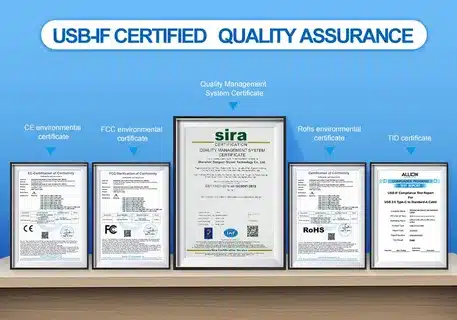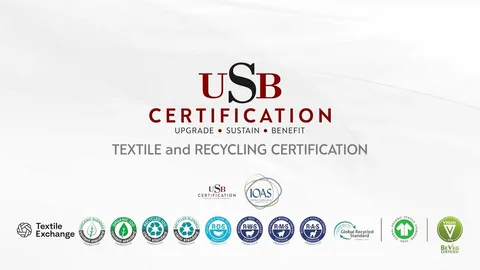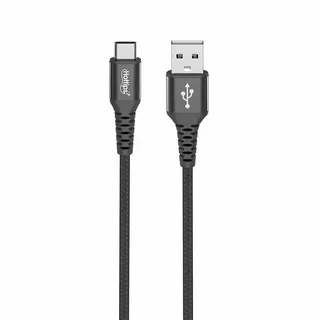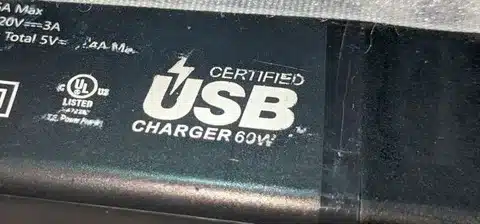Have you ever questioned yourself why a charger or a cable has USB-IF Certified written on it? You are marketing a product, which has been tested widely to ensure that it will not fry your costly equipment or create a safety risk. The USB-IF certification and USB Power Delivery knowledge can assist you in preventing costly mistakes and even potentially hazardous cases by choosing cables, chargers, and adapters.
This tutorial offers all the features and details of USB-IF certification and how you can make the correct decisions and choices when purchasing USB accessories for your cherished electronics.
What is USB-IF and Why Does Certification Exist?

USB Implementers Forum (USB-IF) is a non-profit organization that creates USB specifications and compliance testing. USB-IF was established in 1995 and has a membership of some of the world’s largest technology companies, including Intel, Microsoft, Apple, and HP, working together to advance the long-term interests of the USB standards.
There is certification to give assurance that the products comply with stringent performance, safety, and interoperability requirements. In their absence, you would have compatibility nightmares, safety risks, and untrustworthy charging rates across devices and brands.
How Does USB-IF Certification Work?
The certification is issued on the basis of rigorous testing in certified laboratories. Products are subjected to intense compliance tests such as electrical testing, signal integrity testing, and testing with other devices.
After approval, manufacturers receive official USB-IF logos and a Test ID (TID) number. This TID is certification evidence and can be checked with the USB-IF database. The certification takes into account all the basic connectivity and high-tech functionalities, such as rapid charging and data transfer systems.
Why USB-IF Certification Matters for Safety

The greatest benefit of USB-IF certification is safety and security. Certified products are highly tested to prevent overheating, shorting, and other electrical hazards that would damage your products and create fires.
Performance testing eliminates situations in which the devices charge and transfer data at a higher rate than indicated. You will never have to spend your time on slow charging and unreliable data transfer when certified accessories are in place.
Interoperability will ensure that the certified USB cable or charger will work 100 with many products and brands without trying to find out.
Common Misconceptions About USB-IF Certification
Not every product that is certified is flawless – certification does not mean that the product will last forever and never experience manufacturing flaws. But it is much safer than uncertified options.
Certain high-quality manufacturers can bypass certification (cost) or time constraints, particularly when it is a specialized application. This does not necessarily render their products unsafe, but it needs to be evaluated more thoroughly.
The safety indicator of certification is not the only indicator. Other certifications, such as UL, CE, or FC, may be placed on the products to represent quality and conformity to safety standards.
How to Identify USB-IF Certified Products

Find official USB-IF logos on product packaging – these will contain the USB logo with the text Certified or a USB standard logo such as USB-C Certified or USB 3.0 Certified, reflecting the manufacturer’s responsibility.
Look at Test ID (TID) numbers on packaging or on product documentation. These numbers can be checked against those on the USB-IF site database so that you can be sure that they are not fake.
Compare the quality of branding and packaging with reputed manufacturers. Professional packaging used on legitimate certified products has clear certification markings.
When USB-IF Certification Really Matters

Smartphones. The certification fee is negligible against the damage caused to the device by illogically produced accessories.
Certification is particularly beneficial with fast chargers and high-power delivery cables, since such products operate on substantial electrical loads that would be destructive in poorly designed designs.
When the device used is simply to charge up older devices and low-power accessories, even uncertified items made by reputable manufacturers can be fine with good research speed.
USB-IF vs Other Safety Certifications

USB-IF certification is limited to USB functionality, performance, and interoperability. The UL certification is related to electrical safety, while CE and FCC certifications are related to electromagnetic compatibility and regulatory compliance.
Probably the most sought-after products do have multiple certifications, which can offer an all-encompassing guarantee in various dimensions of safety and performance. USB-IF certification does not supplant other important safety standards.
Seek products with several pertinent certifications to be most confident, particularly with high-power uses or mission-critical applications
file.
Real-World Impact: Making Smart Buying Decisions
Balance certification is also supposed to be part of buying USB accessories alongside other factors like brand reputation, warranty cover, and user reviews. Certified products under unknown brands can still be hazardous, and uncertified brand products of familiar manufacturers can also be safe.
Consider your use – one should take into consideration various safety factors when charging your basic phone, as compared to charging a high-end laptop or transferring crucial information effectively.
Check the reputation of research manufacturers and customer experience, and certification level to conduct the most informed purchasing process.
Why USB-IF Certification Builds Consumer Trust
The certification is an independent third-party confirmation of the products meeting a standard, which you can contact for further details. This eliminates speculations in the buying decision-making process and minimizes risks in purchasing unassured or untrustworthy accessories, USB PD, and guest experience.
To establish a long-term relationship with customers through trust and reliability, manufacturers invest in certification to show their concern for quality and safety.
When consumers purchase certified goods, they are purchasing standards that help the entire industry by improving safety, compatibility, and performance across the entire USB ecosystem power rules.
USB-IF certification is useful as a reference to safer, more reliable USB accessories. Although this is not the only factor, it gives significant confidence concerning the quality and compatibility of the product. The next time you are buying cable types or chargers, make sure they display a USB-IF certification mark, and your devices will be thankful to hotel staff.

